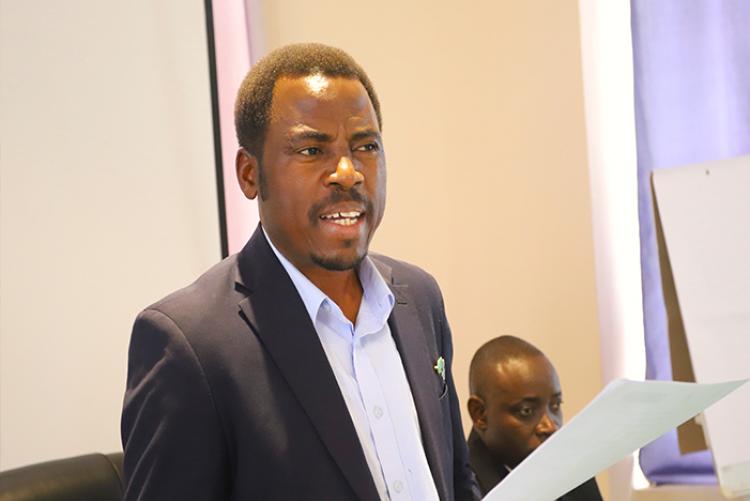Tanzanian government initiatives and policies on improving agriculture productivity through facilitation of investments in agriculture sector, has resulted in increased foreign and domestic investments in agriculture in East Africa Region.
Speaking at dissemination of research result meeting from the project titled “Agriculture Investors as Development Actor? (AIDA), Acting Regional Administrative Secretary, Iringa region Mr. Elias Luvanda, said results from the research have been useful to the development of the country.

Acting Regional Administrative Secretary, Iringa region Mr. Elias Luvanda
He said, research provides either positive or negative development outcomes, are the evidence to continue improving policies, laws, and regulations to be friendly and equal to local and foreign investors to reflect the reality on the ground.
Speaking after the presentations from researchers, the Director of Postgraduate Research, Technology Transfer and Consultancy, Prof. Esron Karimuribo said that research results showed investments in agriculture contributed to positive development outcomes is a due to good policies that facilitate investments in the country. He said, investors in agriculture create employment, although not as expected, but presence of investors in local areas did not affect water access to neighboring farmers.
Earlier Dr. Evelyne Lazaro, Senior Lecturer, during her presentation, she said the study analyzed the effects of foreign investments on economic and livelihoods. Specifically, the study examined land access, employment, and rural community changes. She said, although expectations on employment were high, results indicate only few people were employed in those farms.
“In Tanzania presence of foreign and domestic investor’s farm did not affect food security, land access because Tanzania has good policies and laws on land use and ownership to locals and foreigners”.
Speaking about food availability, Dr. Evelyne Lazaro said investors contributed income through wage labor which they used to buy food and other necessities to households near the farms.
Likewise, Prof. Khamaldin Mutabazi who is also a Senior Lecturer from Sokoine University of Agriculture (SUA) said despite of investor’s good will results shows some farmers did not benefit from the investors.
“Presence of foreign investors create opportunities to surrounding farmers but also farmers have their plans to other opportunities. Farmers also examine to find out what benefits them more. For example, farmers from Iringa and Njombe who invested more in timber trees now they have changed and invest more in avocado production” said Prof. Khamaldin Mutabazi.
Likewise, Dr. Helle Ravnborg from Danish Institute for International Studies (DIIS) said the research showed there are 100 investors in agriculture sector from Denmark in Africa. Danish investors were found to be divided into three groups. Private investments, institutional investors, and limited companies. Private investors were found to provide more to surrounding communities than institutional or company-based investors.
Nicodemus Malley, from Oldeani village, Karatu district, Manyara region asked the government to aid poor farmers to own land and formalization of unregistered land. This will reduce the occurrence of land conflicts with investors. He went on explaining that land ownership has been difficult to farmers and government may intervene to ensure equality in land ownership to facilitate household income from agriculture to be able to meet other social obligations.
In his presentation, PhD student, Mr. Festo Maro said research results show 10% of farmers from Iringa, 18% from Njombe were inspired by investors to grow soya and avocado respectively. These crops were not grown by the farmers before.
Furthermore, research results indicate that 26% of farmers from Njombe and 16% from Iringa exchanged information with investors regarding new seeds or crops, and new agricultural technologies and new ways to plant crops while Karatu it was only 1.2%.
Other results indicate that 74% of farmers from Iringa acquired farm inputs and chemicals from investor while Njombe it was 26%. It was also found that 62% of farmers from Njombe enter into agreement with investors to produce crops adhering to certain quantity, standard and quality.
Agriculture Investors as Development Actor (AIDA) was jointly implemented by Sokoine University of Agriculture, Makerere University, Uganda, Copenhagen University, Denmark, and Danish Institute for International Studies (DIIS) and in collaboration with other stakeholders from Karatu, Iringa and Njombe districts. The project was funded by Danish International Development Agency (DANIDA).
Acting Regional Administrative Secretary, Iringa region Mr. Elias Luvanda (Sitting at Centre) in a group photo with AIDA stakeholders




